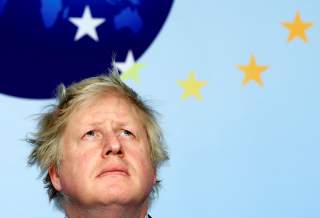Boris Johnson's Election Win Doesn't Pave the Way for a Successful Brexit
Britain isn't out of the woods yet.
Now that the dust has settled, the real business of “getting Brexit done” and running the country begins for Boris Johnson. When it comes to the economy, the data is clear: it’s flatlining. Quarterly figures are at their weakest since 2009; there has been modest growth for services but the manufacturing and construction sectors have contracted. The UK’s trade deficit with the rest of the world has also widened.
Much of this is the result of Brexit uncertainty. While Johnson brings a modicum of certainty about the UK’s direction of travel – out of the EU – its future beyond 2020 remains uncertain. Securing a trade deal with the EU is of utmost importance. But so too is dealing with the country’s underlying economic problems, which have been exacerbated by the recent uncertainty.
The postponing of the November budget has meant a lack of a detailed assessment of the state of government finances, although there have been some recent indicators of a weakening here. More broadly, the election took place against the background of an economy that has seen weak investment and stagnating productivity and wages. Employment remains high; real wages have been growing but for median workers they are still below 2007 levels.
Currency and stock markets reacted very positively to the election result. The new government clearly hopes that implementing a Brexit deal will encourage investment, which has been held back by uncertainty over Brexit.
Higher investment is necessary for sustainable longer-term growth; since the Brexit vote, growth in the UK has been largely driven by consumer spending, with household savings falling to historic lows and personal debt rising. There are limits to the sustainability of this, as household debt levels have now reached worrying levels.
Recent Bank of England estimates indicate that while resolving Brexit uncertainty could improve prospects for investment, much will still depend on the final nature of Britain’s trade agreement with the EU. It is the most productive firms, which tend to be exporters, that have been most affected by this uncertainty. Research suggests that Johnson’s apparent preference for a free trade agreement – “super Canada plus” – would weaken longer-term performance and public finances.
Any such agreement is likely to be complex and time consuming to negotiate. Past experience indicates that it will take years, not months. Nor is it plausible that negotiating trade agreements with other countries would offset lower trade with the EU. So the threat of a disorderly no-deal Brexit at the end of 2020 has not gone away.
A softer Brexit, such as a customs union arrangement with the EU, would soften this blow. A clear path to Brexit should lower uncertainty, but it may be optimistic to expect a major improvement in business and consumer confidence in the short term.
Shaky global economy
The global economic background remains weak. Global growth has been slowing, with weakening performance in the eurozone and the US, Britain’s two major export markets. German manufacturing is stuttering. Tensions in the global economy, particularly from the trade disputes driven by the Trump administration in the US, pose major downside risks to the growth of global markets. The global trade framework is fraying – not necessarily the best circumstances to attempt to negotiate new trade deals.
The Conservative manifesto was light on policy. It only made modest spending commitments, although these may expand in power, and also committed the new administration to not raising income tax, VAT or National Insurance rates – indeed, they have promised to raise the thresholds for paying National Insurance. The Institute for Fiscal Studies thinktank estimates these plans would lead to a small reduction in government borrowing as a proportion of national income over the lifetime of the new parliament. But, critically, this is dependent on achieving a negotiated Brexit. A no-deal Brexit would lead to economic disruption that would lead to a significant rise in government debt.
A key decision for the new government is finding a replacement for Mark Carney as governor of the Bank of England. He is stepping down on January 31, 2020, the same day the UK is due to leave the EU. The Bank of England has maintained low interest rates and has attempted to stabilise the UK economy over recent uncertain times.
Any upturn in economic prospects may lead to the Bank of England raising interest rates, as inflation is currently close to target (although the recovery in sterling’s exchange rate may dampen inflation by lowering import prices). More generally, Carney’s successor will take over at a crucial moment and is unlikely to have much of a honeymoon period.
Brexit uncertainty aggravated the UK economy’s earlier, underlying problems – low investment by historic and international standards, stagnant productivity and wages. Ending Brexit uncertainty may boost confidence, but it’s hard to say how long this will last. And against the background of a weak global economy the new government still faces major challenges.
![]()
Jonathan Perraton, Senior Lecturer in Economics, University of Sheffield
This article is republished from The Conversation under a Creative Commons license. Read the original article.
Image: Reuters

